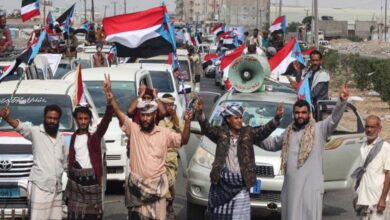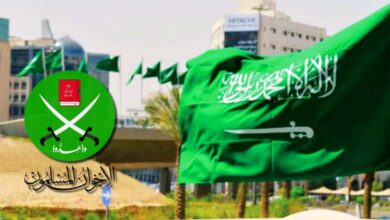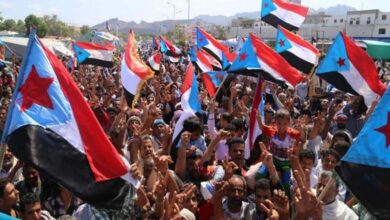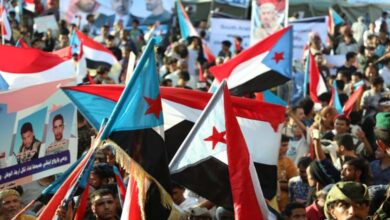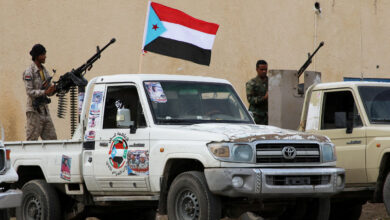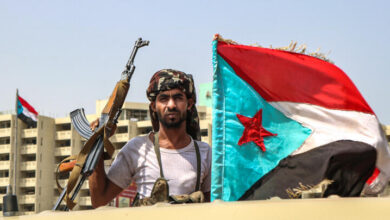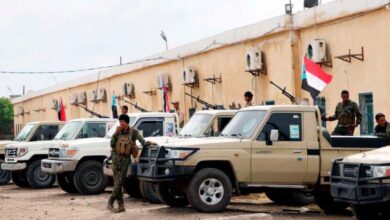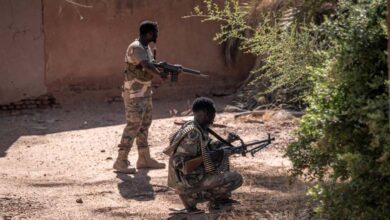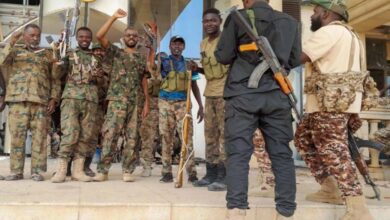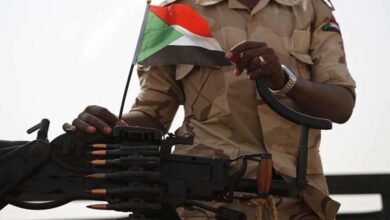How do supporters of Omar al-Bashir participate in the Sudanese army?
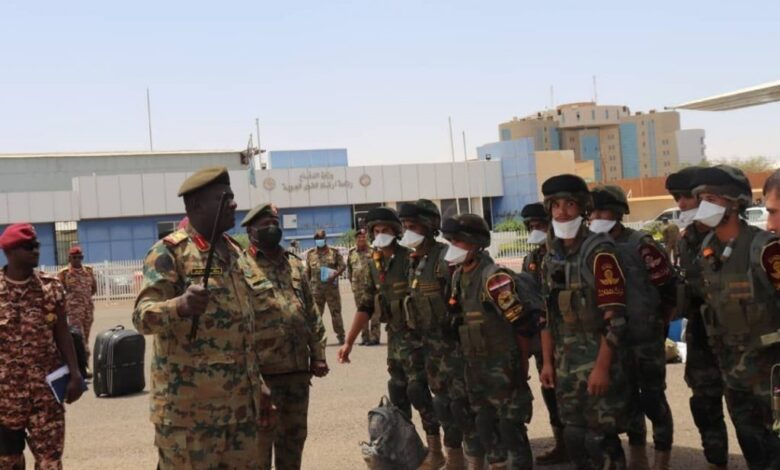
The army declared a state of alert as soon as Islamists rushed to its aid, and leaders from the ousted President Omar al-Bashir‘s regime intensified their efforts to mobilize those they call mujahideen.
Thousands of members of the movement joined the army in recent weeks, according to testimonies collected by the BBC.
🎯 #توضيح كتائب الحركة الاسلامية الجها.ديين ليسو بمستنفرين بل هم من بدأ الحرب أي أنهم أطلقوا الرص.اصة الأولي وعملية الاستنفار #تمويه لوجودهم من دربهم لاستخدام نوعية الاسلحة الثقيلة بمافيها الدروع و أدخلهم بكامل عتادهم لمقرات الجيش وهم تبع حزب وحركة محلولين غالبيتهم في المدرعات pic.twitter.com/NLvrDK1RDh
— Dr- HanAmin 🇸🇩🦋📿 (@hanaelmeen1) August 6, 2023
However, the Sudanese army denies that the Islamists are an active party in the fighting, and it condemns some of them for accusing it of becoming a breeding ground for Islamist fighters.
In this report, we present the identity of the volunteer fighters alongside the army. What are they doing? And why do many fear their appearance?
“Volunteer Mujahideen” al-Chadhili says, “As soon as I return from work at noon, I join the camp daily to train on the use of weapons and combat skills. I spend the rest of the day there and return home at sunset.”
He joined the Southern Sawaqy camp in the city of Kassala in eastern Sudan, which was one of the first and most prominent areas to witness the mobilization of hundreds of volunteers to support the army. Observers have linked this mobilization to the movements led by leaders from the regime of the former President Omar al-Bashir.
Before joining the camp, Atta attended one of these meetings organized by former regime leader Ahmed Haroun.
Ahmed Haroun is one of the most prominent faces of the former regime, wanted by the International Criminal Court, and one of the most active leaders in recruiting fighters from eastern Sudan, according to testimonies collected by the BBC.
Haroun left prison at the beginning of the fighting last April, where he was detained on charges of committing war crimes.
“Ahmed Haroun wanted to participate in the war with the Sudanese army, and he wanted to mobilize members of the Islamic movement as part of the people. This is a position to his credit,” says al-Chadhili.
Lawyers and civil activists criticized these movements by Haroun and called on the prosecution to arrest him, considering him “a fugitive from prison.” However, the Sudanese prosecution canceled the arrest warrant for Haroun days after it was issued, without a clear reason.
Atta condemns this attack on Haroun. And he sees it as an attempt to weaken the position of the army and leave it without popular backing. He says that these attempts will not hinder their support for the army: “The Islamists offered the best of their battalions and members to join this war. Ahmed Haroun is Sudanese, and no one can minimize his role, and I am Sudanese, and no one can minimize my role, even if it’s the same army.”
Kassala has not witnessed battles yet, but Atta believes that what he describes as “the rebellion” must be suppressed in Khartoum, where the fighting between the two sides is concentrated, so that it does not spread to the safe states.
Many of Atta’s colleagues moved to Khartoum to fight alongside the army, and he is waiting for his turn to join them.
When we spoke to al-Chadhili, two groups of his colleagues had already headed to Khartoum.
Seventeen thousand people represent the first batch of volunteers in the state of Kassala who were sent to Khartoum, according to al-Chadhili‘s estimate. He says, “When every city sends 700 mobilized people to Khartoum, the number of volunteers in the capital becomes very large.”
They fight with the army
In early July, the Rapid Support Forces attacked a police force headquarters called the Central Reserve west of the capital.
The clips show that the army, police, and groups of Islamist fighters participated in defending the headquarters.
Mustafa, an alias for a university student who spoke with us on the condition of hiding his identity, participated in that battle.
He joined a military unit near his home in Omdurman, west of Khartoum, a month after the start of the fighting. He says, “A month after the start of the war, the Commander-in-Chief of the Armed Forces, Abdul Fattah Al-Burhan, issued a call asking the youth to join. Since then, I and my colleagues have become part of the army, and I have participated in several battles in Omdurman.”
He did not need much training, as he had completed a mandatory training course that students receive after completing their secondary education shortly before the war. He quickly joined the fighting in the capital.
According to Mustafa, the Islamists represent about 30% of the mobilized people, and they are the most prominent volunteer entities. But he denies that they have their own forces, saying, “When Omar al-Bashir’s supporters join, they become part of the army, and they move under its command, they are not independent forces.”
Mustafa adds, “In times other than combat, I spend the whole day in the camp. We do many activities, including training, studying the Quran, and the Prophet’s biography.”
Video clips on social media sites show the appearance of a number of Islamist leaders inside army camps, where they delivered sermons urging fighters to continue “jihad.”
Complete Islamic battalions

The videos published after the Central Reserve Battle prominently feature what is known as the “Bura’a bin Malik Battalion.”
This group received its arms since the first day of combat. Recorded video clips that have spread on social media and documented by the BBC show the battalion’s use of drones, which are typically in the possession of armies.
Historically, the battalion was part of semi-independent forces known as the “People’s Defense,” and these forces had close ties to the Islamic movement and the dissolved National Congress Party.
The battalion is led by a person named “Al-Musbah Abu Zeid,” who describes himself on Facebook as the owner of a household goods company.
A few days ago, it was announced that the battalion had been converted into a brigade, allegedly surpassing twenty thousand fighters.
In the days following the Central Reserve Battle, some celebrated the participation of a group called the Operations Authority.
The Operations Authority has long been accused of being the strong arm of the security and intelligence apparatus during the era of al-Bashir. It was dissolved in 2020 after what appeared to be a rebellion led by some of its members against the army and the Rapid Support Forces.
At the time, it was rumored that the leader of the Rapid Support Forces was behind the call for its dissolution, and it now plays a prominent role in the battles against the Rapid Support Forces.
Islamists are not alone

Al-Chadhili and Mustafa deny that only Islamists volunteer in the army.
Al-Chadhili insists that volunteers shed their political affiliations when they join the military camps, but he also emphasizes that people with different orientations exist: “There are Islamists, just like there are Communists or Resistance Committees. This is a war where we are driven by national conscience and our concern for the dignity that the Rapid Support Forces violated.”
The young men accuse the Rapid Support Forces of committing war crimes, including “rape and racially motivated killings,” charges denied by those forces.
We spoke to Hisham, a member of the Resistance Committees, which played a prominent role in organizing demonstrations against the military rule in Sudan. He is also an opponent of the coup carried out by the army in 2021 against the then-civilian transitional government.
At the beginning of the war, Hisham volunteered to care for the sick and meet the needs of the elderly in his area. However, he later joined the armed forces.
“I trained for two months before I joined the fighting. I participated in the Central Reserve Battle, and our main role was to secure security positions and protect the army’s rear in battles. Usually, we are not in the front lines, where higher readiness is needed.”
Hisham does not see a contradiction between his stance against military rule and his joining the army, saying, “We didn’t have a problem with the army itself; our problem is with military rule, and our demands to end it are still valid. Even if I die in this war, my colleagues will return after it’s over to demand an end to military rule.”
Why do some fear these fighters?
Islamists ruled for three decades before being toppled by a popular revolution in 2019.
During that period, the regime was accused of excessive violence against opposition, committing massacres in various parts of the country, especially in the Darfur region. International courts are still pursuing the leaders of the former regime, including former President Omar al-Bashir, for these charges.
Politicians fear that the return of Islamists to the forefront could be a step toward their return to power in the future. Sudanese journalist Taher al-Mutasim warns that the same mistakes that happened in the past could repeat. He says, “The Rapid Support Forces were fighting in Darfur alongside the Sudanese army since 2003 and reached what could be described as a rebellion.”
“Any citizen would be honored to participate with his army, but political groups will not be satisfied with this honor; they will seek a foothold in power. It’s like someone who went out through the door and tries to come back through the window,” says al-Mutasim.
Al-Mutasim’s concerns do not stop at the return of the previous regime but rather what might result from it. He says, “The danger of this experience is that it repeats what happened during 30 years of Islamist rule when slogans of religious and holy wars were raised against a part of the nation.”
He describes it as a bitter experience where “Sudan was placed on the list of state sponsors of terrorism, international sanctions were imposed on Sudan, and the Sudanese citizens paid the price,” according to al-Mutasim.
On the other hand, al-Chadhili believes that Islamists have the right to aspire to return to power through elections. He wonders, “If the people decide that they want Islamists, what’s the problem? Islamists have a popular base and can win in any elections, but we won’t return with guns.”
-
Demands for the removal of Al-Burhan in the face of preferential treatment of wounded army personnel
However, Hisham opposes the return of Islamists to power and sees their participation in the war as an attempt to impose a fait accompli paving the way for their return. But he also believes that the participation of Islamists in the war should not be an obstacle to non-Islamists volunteering alongside the army. He says, “Yes, there are ‘kaizan’ (a term some Sudanese use to describe Islamists), but I look at every fighter as a Sudanese, and I won’t let my country go to waste because of their participation. After the war, we will remove them as we did with others. We will cleanse the country of them, and none will be left.”
Deployment versus concerns about a civil war
As the army mobilizes, the Rapid Support Forces continue to gather fighters and Arab tribes to fight the army in Khartoum and in the Darfur region in the west of the country. From time to time, defectors from the Sudanese army join their ranks.
The mobilization and counter-mobilization terrify many, especially the Forces for Freedom and Change, the leading civilian opposition bloc in the country. Omar Al-Degair, a leader of the Forces for Freedom and Change, says, “We do not support the Rapid Support Forces in this war, nor are we against the armed forces. We are against the war itself because we believe it is a threat to our nation, not to mention the humanitarian catastrophe and violations. It is a recipe for the complete destruction of our country. It could turn into a civil war or a playground for international intervention.”
Al-Degair adds, “We are using all our energy to stop this war.”
We attempted to obtain a comment from the army, but we did not receive a response by the time of publishing the report.
While battles intensify, most Sudanese find themselves with few options, especially since many have become displaced and most are struggling to make ends meet in the midst of what appears to be a long-lasting war.


